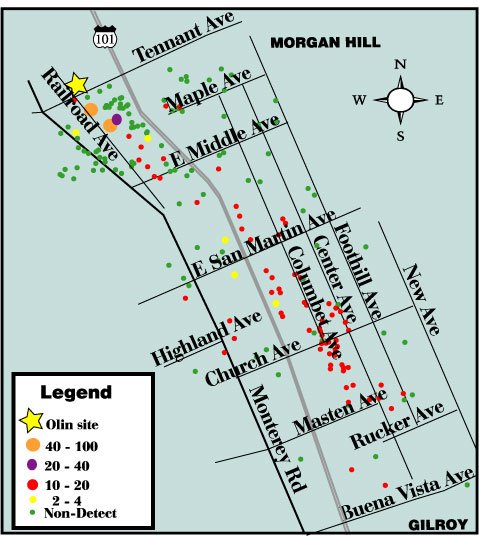SAN MARTIN
– The Olin Corp. and Standard Fusee Corp. were hit Friday
afternoon with the first lawsuit over levels of potassium
perchlorate in some South Valley wells.
SAN MARTIN – The Olin Corp. and Standard Fusee Corp. were hit Friday afternoon with the first lawsuit over levels of potassium perchlorate in some South Valley wells.
The chemical is alleged to have entered the underground water table from the corporations’ now-closed plant at Tennant and Railroad avenues in Morgan Hill and migrated south, southeast, contaminating at least one-third of the San Martin wells tested to date.
The class-action suit, filed in Santa Clara County Superior Court by attorney Richard Alexander on behalf of five San Martin clients, seeks unspecified damages against the firms, claiming the chemical polluting their private wells has caused their property values to plummet and potentially cause thyroid-related and other health problems.
The suit also named two Olin supervisors and 50 unnamed employees and requested a jury trial. It accused Olin Corp. of wrongful, negligent acts in its disposal of perchlorate during the 40 years it manufactured safety flares on the site; it asks for remedies.
Alexander is a principal with Alexander, Hawes and Audet, a San Jose law firm that handles toxic chemical and environmental pollution cases. He spoke at a meeting Wednesday between five agencies involved with the perchlorate issue and about 800 worried residents, warning them that he was about to file the suit.
A letter Alexander distributed during the meeting established that his firm would handle lawsuits on a contingency basis – “no recovery: no fees, no costs” guaranteed in writing.
The case is a class action complaint seeking medical monitoring and claims for “negligence, nuisance, intentional infliction of emotional distress, trespass, equitable relief and damages and punitive damages.” The suit was filed on behalf of Mark and Kisti Daniels, Sue McElwaine, all of whom live on Llagas Avenue, and Louis J. Katen Jr. and Fred N. Threatt, Columbet Avenue residents.
A class action suit is filed by one or more members of a large group on behalf of all members of the group. Others are eligible to join the suit. The suit implies that many more of the people – estimated to be 2,000 – who get their water from wells affected by the chemical might join in the complaint.
While the community has dealt with the possible health threats of perchlorate in the water since its presence was announced in mid-January, the specter of greatly reduced property values only recently reached public view. Stories of buyers backing out and refinancing efforts going astray are surfacing and are part of the lawsuit.
Because, the lawsuit alleges, Olin Corp. neglected to properly dispose of the chemical, and because the residents are in danger of illnesses and conditions resulting from exposure to the chemical, the lawsuit requests the court to order Olin to create a medical monitoring, surveillance and treatment fund to monitor the health and pay for treatment for residents now in the affected area and those who may have used the wells since 1955.
Further, the lawsuit insists that the plaintiffs – the San Martin residents – will suffer worry, pain and distress from the fact that the perchlorate is in their wells, and deserve compensation.
Olin Corp. and Standard Fusee Corp. manufactured highway safety flares using the chemical on the site from 1955 to 1996. Perchlorate is a byproduct of such manufacture and that of matches and, in larger quantities, of rocket fuel.
During the manufacturing process, according to Jim Crowley, engineering unit manager for the Santa Clara Valley Water District, the left-over perchlorate was disposed of in a percolation pond on the site where it leached into the underground aquifer.
Threatt said he has lived on Columbet Avenue for five years and that his well has tested “clean” – or at least below the 4 parts per billion that the state calls an “action level.”
“Right now it’s clear,” he said, “but it doesn’t stay constant; it moves around.”
Threatt also was worried about the value of his property.
“I’ve heard that the values have already dropped 10 percent,” he said. “You can’t get anybody to refinance or sell these properties. They don’t ask if your well is clean; they ask where you live.”
Threatt said he joined the lawsuit partly because he was dissatisfied with the response from local agencies.
“Could I have gone to Olin (for remedy)?” he said. “I couldn’t even get an answer from the water district – or the ag commissioner. The only people who can talk to them is the lawyers.”
Threatt said he has seven new baby lambs.
“They can’t tell me if it’s OK to give them well water or not,” he said. “I want a letter from the ag commissioner saying it is OK to give them the water. I want a guarantee that my well will stay clean.”
Olin Corp. has voluntarily accepted responsibility for the perchlorate problem since it first discovered the chemical in well water as early as 2000. California state law also requires the polluting company to pay for the results of the pollution and for its cleanup.
Rick McClure is a spokesman for Olin and said he too is frustrated by the lack of solid answers to the questions of the chemical’s effect on people, plants and animals and of the indefinite methods and time of cleanup.
“I wish more than anybody that I could give concrete answers to people, but we’re still trying to get our arms around where it (the perchlorate) is. I’ve tried to be responsive, to reach out to the San Martin Neighborhood Association and others in the area,” he said. “Olin is being responsible.”
Disposing perchlorate into the ground was not illegal during the time the Olin plant was operating.
About one-third of the wells tested show levels above 4 ppb; this number now includes water from the San Martin Water Company that serves 200 customers east of Monterey Road – including San Martin/Gwinn School. The school’s drinking fountains were shut off Thursday morning and bottled water delivered to the school.
Olin has been providing bottled water, temporarily for everyone whose well was being tested, and permanently for those whose wells test positive.
Perchlorate is known to affect the intake of iodide by the thyroid gland, especially in infants and those with sensitive thyroids. What is not known is the level at which it becomes a problem.
San Martin residents, many of whom say they moved to the area because of the feeling of open space.
“It’s wonderful to watch the stars,” Threatt said, “but we have enough worry with earthquakes; I don’t want to worry about the water too.”














